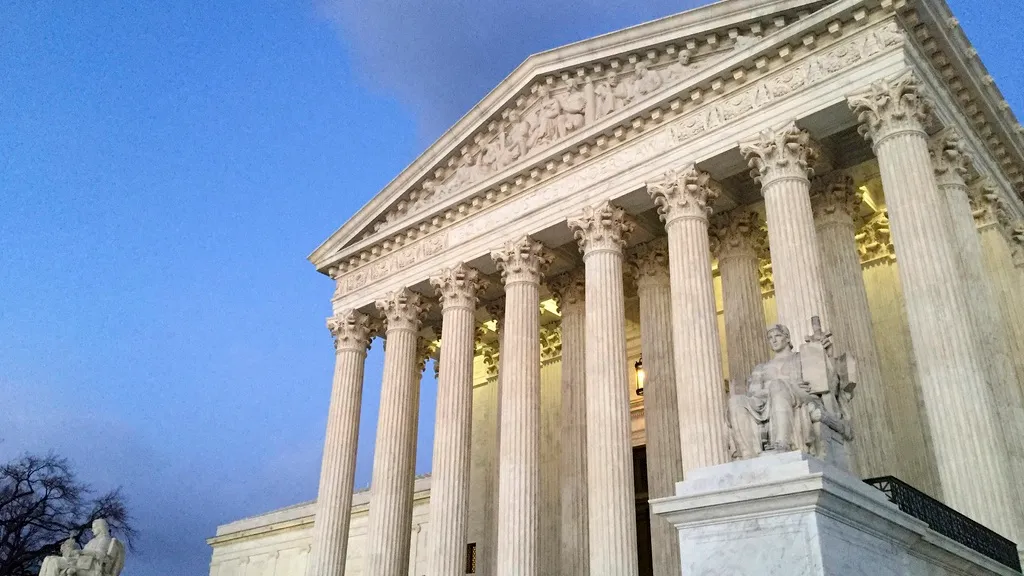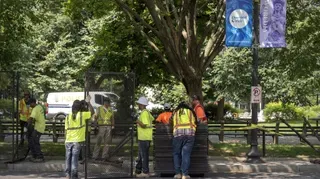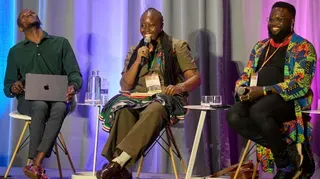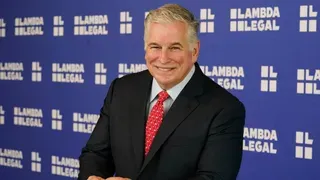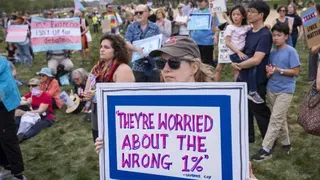September 18, 2011
Gay pioneer Arthur Evans dies
Kevin Mark Kline READ TIME: 8 MIN.
Gay pioneer, writer, and neighborhood activist Arthur Evans, who lived at the corner of Haight and Ashbury streets in San Francisco since 1974, died Sunday, September 11 at his home. He was 68.
Naphtali Offen, a close friend of Mr. Evans's and the executor of his estate, said that he suffered a heart attack around 4:30 a.m. Mr. Evans had been diagnosed with a large aortic aneurysm in October 2010 and was not expected to live more than a few months, Offen said.
"He spent his last year pursuing his pleasures: translating ancient Greek, playing chess with his best friend, going to the Castro Theatre, dining out, writing letters to the editor, and visiting friends," Offen said. "He remained chipper to the end."
Mr. Evans was a complicated man, working for gay liberation in its earliest days, but supporting local quality of life measures to the consternation of progressives in his later years.
"It's not hard to remember the Arthur Evans who embodied the defiant spirit of gay pride that was born at Stonewall (no, he wasn't among the cast of thousands claiming to have been there). Or the tireless activist of the 1970s and 1980s, who shouted down homophobes and protested outside drug companies because of their price gouging of AIDS medications," said longtime housing activist Tommi Avicolli Mecca. "Or the gentle man who did extensive research into faeries and gay male involvement in spiritual traditions in the west because he didn't believe in the hyper-masculine Castro clone identity that so many gay men were drawn to during the disco era."
But Avicolli Mecca and others opposed Mr. Evans on several local issues, including last year's sit/lie ballot measure, which bans sitting or lying on city sidewalks during certain hours.
In recent years, Mr. Evans often clashed with progressive LGBTs. His support for the sit/lie measure provoked intense criticism from many of the city's self-styled progressives. To which, he replied: "Neighborhood safety is a progressive issue. How can we make the world a better place if we neglect improving our own neighborhoods?"
Avicolli Mecca, for one, broke with Mr. Evans on quality of life issues.
"Though in the last decade Arthur and I were on opposite sides of many issues, I never stopped respecting him for the work he did in the 1970s and 1980s to challenge the still-entrenched homophobia in this country. He remains a giant of gay liberation," Avicolli Mecca said.
The Reverend Jim Mitulski, a former pastor at Metropolitan Community Church-San Francisco in the Castro, also disagreed with Mr. Evans on the homeless issue.
"He was a complex and creative person," Mitulski, now pastor at New Spirit Community Church in Berkeley, said. "As he aged he seemed to me to embrace positions that seemed counter to his early days as a social and political radical with deeply spiritual roots. Though I was puzzled and even disappointed by his apparent animosity toward the homeless, for example, I admire his contribution to our movement, especially during the early years."
Joey Cain, who was a neighbor of Mr. Evans's, said that for the last 15 years or so, Mr. Evans "wasn't about rational dialogue."
"I think he was very harmful in terms of politics in the Haight-Ashbury. He actively worked to defeat programs that helped kids."
According to Cain, Mr. Evans was known as the "Ann Coulter of Haight Street," in spite of his progressive roots and work with early gay activism.
"I did have an affection for Arthur," Cain said, but the two usually avoided discussing political issues when they saw one another.
Early days
In the late 1960s and early 1970s, Mr. Evans played a pivotal role in the newly emergent gay liberation movement in New York City.
A few weeks after the famous Stonewall Riot of June 1969 (which he missed), Evans and his lover, Arthur Bell, joined the Gay Liberation Front, a new group that proudly proclaimed itself to be gay, countercultural, and revolutionary.
Within GLF, Mr. Evans and others created a cell called the Radical Study Group to examine the historical roots of sexism and homophobia. Many of the participants later became published authors, including, besides Mr. Evans and Bell, John Lauritsen, Larry Mitchell, and Steve Dansky.
A number of GLF members, including Mr. Evans, soon became dissatisfied with the organization, complaining that it lacked a coherent, ongoing program of street activism. At the suggestion of GLF member Jim Owles and Marty Robinson, about 12 people met in Bell's Manhattan apartment on December 21, 1969, and founded the Gay Activists Alliance. Mr. Evans wrote the group's statement of purpose and much of its constitution.
Through GAA, Robinson, Evans, and Owles developed the tactic of "zaps." These were militant (but non-violent) face-to-face confrontations with persons in authority. Mr. Evans was often arrested in such actions, participating in disruptions of local business offices, political headquarters, local TV shows, and the Metropolitan Opera.
In November 1970, Robinson and Mr. Evans, along with Dick Leitsch of the Mattachine Society, appeared on the Dick Cavett Show. They were among the first openly gay activists to be prominently featured as guests on a national TV program.
It was a big change from Mr. Evans's earlier days in York, Pennsylvania, where he was born on October 12, 1942. His father worked most of his life on assembly lines, the last in a chain factory. His mother ran a small beauty shop out of a front room in the family house.
When Mr. Evans graduated from public high school in 1960, he received a four-year scholarship from the Glatfelter Paper Company in York County to study chemistry at Brown University in Providence, Rhode Island. While at Brown, Evans and several friends founded the Brown Freethinkers Society, describing themselves as "militant atheists" seeking to combat the harmful effects of organized religion.
The group picketed the weekly chapel convocation at Brown, then required of all students (even though Brown is a secular institution) and urged students to stand in silent protest during the compulsory prayer. National wire services picked up the story, which appeared in a local York newspaper.
As a result, the Glatfelter Paper Company informed Mr. Evans that his scholarship would be canceled. For help, Mr. Evans turned to Joseph Lewis, the elderly millionaire who headed the national Freethinkers Society. Lewis threatened the paper company with a highly publicized lawsuit if the scholarship were revoked. The company relented, the scholarship continued, and Mr. Evans changed his major from chemistry to political science.
Although obstreperous politically, Mr. Evans remained closeted sexually and very lonely, not knowing any other gay person. Throughout both high school and college, he often thought of suicide. In 1963, after completing three years at Brown, he read an article in class=ITALICCHARACTER>a national magazine reporting that many "homosexuals" lived in Greenwich Village in New York City. He promptly withdrew from Brown and moved to the Village, a change that he later described it as the best move he ever made in his life.
Gay life
In 1963 Mr. Evans discovered gay life in Greenwich Village and in 1964 became lovers with Bell. In 1966 he was admitted to City College of New York, which accepted all his credits from Brown University. He participated in his first sit-in on May 13, 1966, when a group of students occupied the administration building of City College in protest against the college's involvement in the Selective Service System. A picture of the students, including Mr. Evans, appeared the next day on the front page of the New York Times.
In 1967, after graduating with a B.A. degree from City College, Mr. Evans was admitted into the doctoral program in philosophy at Columbia University, specializing in ancient Greek philosophy. His doctoral adviser was Paul Oskar Kristeller, then the world's leading authority on Renaissance humanist philosophy. Kristeller had studied under Karl Jaspers and Martin Heidegger in Germany but fled to Columbia University after his parents were killed in the Holocaust.
Mr. Evans participated in many anti-war protests during these years, including the celebrated upheaval at Columbia in the spring of 1968. In the same year he also participated in the protests at the Democratic convention in Chicago. During this time, the poetry of Allen Ginsberg had a powerful influence on the formation of his values. While at Columbia, Mr. Evans joined the Student Homophile League, founded by Nino Romano, although he was still closeted.
In 1971 Mr. Evans and Bell, by then a columnist for the Village Voice, separated. Bell later died from diabetic complications in 1984.
By the end of 1971, Mr. Evans had become alienated from urban life and the academic world. With a second lover, Jacob Schraeter, he left New York in April 1972 to seek a new, countercultural existence in the countryside.
Using Seattle as a base, Mr. Evans, Schraeter, and a third gay man formed a group called the Weird Sisters Partnership. They bought a 40-acre spread of forest land on a remote mountain in northeastern Washington state, which they named New Sodom. Mr. Evans and Schraeter lived there in tents during summers.
During winter months in Seattle, Mr. Evans continued research that he had begun in New York on the underlying historical origins of the counterculture, particularly in regard to its sex. In 1973 he began publishing some of his findings in a gay journal called Out and later in Fag Rag . He also wrote a column on the political strategy of zapping for the Advocate, a national gay newspaper.
San Francisco
In 1974, Mr. Evans and Schraeter moved into an apartment at the corner of Haight and Ashbury streets in San Francisco. Schraeter returned to New York in 1981 and died from AIDS in 1989.
In the fall of 1975, Mr. Evans formed a new pagan-inspired spiritual group in San Francisco, the Faery Circle. It combined countercultural consciousness, gay sensibility, and ceremonial playfulness.
In 1976 he gave a series of public lectures, entitled "Faeries," on his research on the historical origins of the gay counterculture. In 1978 he published this material in his groundbreaking book Witchcraft and the Gay Counterculture. It demonstrated that many of the people accused of "witchcraft" and "heresy" in the Middle Ages and Renaissance were actually persecuted because of their sexuality and adherence to ancient pagan practices.
Cain said the book "was incredibly influential."
At this time, Mr. Evans also was active in Bay Area Gay Liberation and the San Francisco Gay Democratic Club, which later became the vehicle through which Harvey Milk rose to political prominence. He and his friend Offen opened a small Volkswagen-repair business, which they named The Buggery.
In the late 1970s, Mr. Evans became upset at the pattern of butch conformity that was then overtaking gay men in the Castro. Adopting the nom de plume of "The Red Queen," he distributed a series of controversial satirical leaflets on the subject. In a leaflet of 1978, entitled "Afraid You're Not Butch Enough?" he facetiously referred to the new, butch-conforming men of the Castro as clones, initiating use of the now widely used term "Castro clones."
In 1984 Mr. Evans directed a production at the Valencia Rose Cabaret in San Francisco of his own new translation, from the ancient Greek, of Euripides's play Bakkhai . The hero of Euripides's play is the Greek god Dionysos, the patron of homosexuality. In 1988, this translation, together with Mr. Evans's commentary on the historical significance of the play, was published by St. Martin's Press in New York under the name of The God of Ecstasy.
As AIDS began to spread in the 1980s, Mr. Evans became active in several San Francisco groups that later morphed in ACT UP/SF, although he himself was HIV-negative. With his good friend, the late Hank Wilson, he was arrested twice while demonstrating against the drug-maker Burroughs-Wellcome, accusing it of price-gouging, and once against a local TV station, charging it with defamation of people with AIDS.
In 1988, Mr. Evans began work on a nine-year project on philosophy. Thanks to a grant from the San Francisco Arts Commission, it was published in 1997 as Critique of Patriarchal Reason and included artwork by San Francisco artist Frank Pietronigro.
The book is a monumental overview of Western philosophy from antiquity to the present. It shows how misogyny and homophobia have influenced the supposedly objective fields of formal logic, higher mathematics, and physical science. Kristeller, Mr. Evans's former doctoral adviser at Columbia University, called the work "a major contribution to the study of philosophy and its history."
Mr. Evans is survived by his brother Joe Evans of Durand, Michigan, his best friend Offen, and a host of longtime friends. A memorial service is being planned for mid-October. For details contact Offen at [email protected].
Mr. Evans wrote his own obituary prior to his death, much of which has been included in this article.
